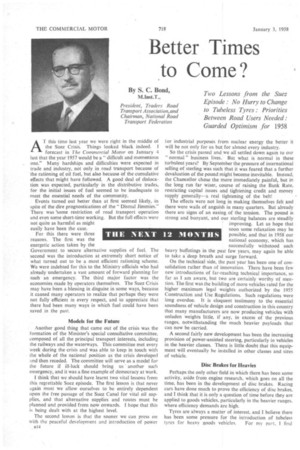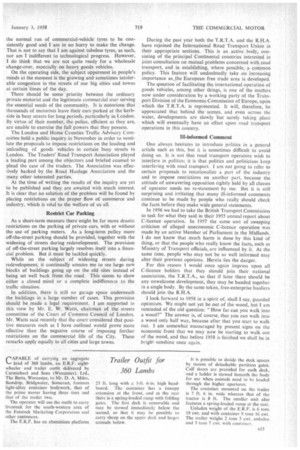Better Times
Page 48

Page 49

If you've noticed an error in this article please click here to report it so we can fix it.
to Come?
By S. C. Bond,
AT this time last year we were right in the middle of the Suez Crisis. Things looked black indeed. I forecast in The Commercial Motor on January 4 last that the year 1957 would be a "difficult and momentous one." Many hardships and difficulties were expected in trade and industry, not only in road transport because of the rationing of oil fuel, but also because of the cumulative effects that might have followed. A good deal of dislocation was expected, particularly in the distributive trades, for the initial issues of fuel seemed to be inadequate to meet the essential needs of the community.
Events turned out better than at first seemed likely, -in spite of the dire prognostications of the "Dismal Jimmies." There was 'some restriction of road transport operation and even some short-time working. But the full effects were not quite as harmful as might easily have been the case.
For this there were three reasons. The first was the energetic action taken by the Government to secure alternative supplies of fuel. The second was the introduction at extremely short notice of what turned out to be a most efficient rationing scheme. We were indebted for this to the Ministry officials who had already undertaken a vast amount of forward planning for such an emergency. The third major factor was the economies made by operators themselves. The Suez Crisis may have been a blessing in disguise in some ways, because it caused many operators to realize that perhaps they were not fully efficient in every respect, and to appreciate that there had been many ways in which fuel could have been saved in the past.
Models for the Future
Another good thing that came out of the crisis was the formation of the Minister's special consultative committee, composed of all the principal transport interests, including the railways and the waterways. This committee met every week during the crisis and was able to keep in touch with the whole of the national position as the crisis developed and then receded. The committee will serve as a model for the future if ill-luck should bring us ' another such emergency, and it was a fine example of democracy at work.
I think that we should have learnt two vital lessons from this regrettable Suez episode. The first lesson is that never again must we allow ourselves to be entirely dependent upon the free passage of the Suez Canal for vital oil supplies, and that alternative supplies and routes must be planned and provided from now onwards. I hope that this is being dealt with at the highest level.
The second lesson is that the sooner we can press on with the peaceful development and introduction of power n14 for industrial purposes from nuclear energy the better it will be not only for us but for almost every industry.
So the crisis passed and we all settled down again to our "normal" business lives. But what is normal in these turbulent years? By September the pressure of international selling of sterling was such that it was feared that a further devaluation of the pound might become inevitable. Instead, the Chancellor chose the more immediately painful, but in the long run far wiser, course of raising the Bank Rate, restricting capital issues and tightening credit and money supply generally—a real tightening of the belt!
The effects were not long in making themselves felt and there were wails of anguish in many quarters. But already there are signs of an easing of the tension. The pound is strong and buoyant, and our sterling balances are steadily improving. Let us hope that soon some relaxation may be possible, and that in 1958 our national economy, which has successfully withstood such heavy buffetings in the past few years, may again be able to take a deep breath and surge forward.
On the technical side, the past year has been one of consolidation rather than of innovation. There have been few new introductions of far-reaching technical importance, so far as I am aware, but two are certainly worthy of mention. The first was the building of more vehicles rated for the higher maximum legal weights authorized by the 1955 Construction and Use Regulations. Such regulations were long overdue. It is eloquent testimony to the essential soundness of vehicle design and construction in this country that many manufacturers are now producing vehicles with unladen weights little, if any, in excess of the previous ranges, notwithstanding the much heavier payloads that can now be carried.
A second fairly new development has been the increasing provision of power-assisted steering, particularly in vehicles in the heavier classes. There is little doubt that this equipment will eventually be installed in other classes and sizes of vehicle.
Disc Brakes for Heavies
Perhaps the only other field in which there has been some activity, aside from engine research, which goes on all the time, has been in the development of disc brakes. Racing cars have done much to prove the efficiency of disc brakes. and I think that it is only a question of time before they are applied to goods vehicles, particularly in the heavier ranges, where efficiency demands are high.
Tyres are always a matter of interest, and I believe there has been some pressure for the introduction of tubeless tyres for heavy goods vehicles. For my part. 1 find the normal run of commercial-vehicle tyres to be consistently good and I am in no hurry to make the change. That is not to say that I am against tubeless tyres, as such, nor am I indifferent to technological progress. However, I do think that we are not quite ready for a wholesale change-over, especially on •heavy goods vehicles.
On the operating side, the subject uppermost in people's minds at the moment is the growing and sometimes intolerable congestion in -the streets of our big cities and towns at certain timesof the day.
There should be some priority between the ordinary private motorist and the legitimate commercial user serving the essential needs of the community. It is notorious that thousands of motorists leave their cars parked at the kerbside in busy streets for long periods, particularly in London. By virtue of their number, the police, efficient as they are, are unable to exercise the full powers that they possess.
The London and Home Counties Traffic Advisory Committee held a public inquiry in November in order to ventilate the proposals to impose restrictions on the loading and unloading of goods vehicles in certain busy streets in London. The Traders' Road Transport Association played a leading part among the objectors and briefed counsel to plead the case of the traders. The Association was effectively backed by the Road Haulage Association and the many other interested parties.
At the time of writing the results of the inquiry are yet to be published and they are awaited with much interest. It is clear that no solution of the problem will be found by placing restrictions on the proper flow of commerce and industry, which is vital to the welfare of us all.
Restrict Car Parking
As a short-term measure there might be far more drastic restrictions on the parking of private cars, with or without the use of parking meters. As a long-term policy more off-the-street parking should be provided, together with the widening of streets during redevelopment. The provision of off-the-street parking largely resolves itself into a financial problem. But it must be tackled quickly.
While on the subject of widening streets during redevelopment, it continually amazes me to see large new blocks of buildings going up on the old sites instead of being set well back from the road. This seems to show either a closed mind or a complete indifference to the traffic situation.
In addition, there is still no garage space underneath the buildings in a large number of cases. This provision should be made a legal requirement. I am supported in this view by Mr. E. W. Watts, chairman of the streets committee of the Court of Common Council of London. Mr. Watts said recently that the court considered that positive measures such as I have outlined would prove more effective than the negative course of imposing further restrictions on the commercial life of the City. These remarks apply equally to all cities and large towns.
During the past year both the T.R.T.A. and the R.H.A. have rejoined the International Road Transport Union in their appropriate sections. This is an Active body, consisting of the principal Continental countries interested in joint consultation on mutual problems concerned with road transport, and in establishing, where possible, A common policy. This feature will undoubtedly take on increasing importance as,the European free trade area is developed.
The question of facilitating the international operation of goods vehicles, among other things, is one of the matters now under consideration by a working party of the Transport Division of the Economic Commission of Europe, upOn which the T.R.T.A. is represented. It will, therefore, be appreciated that behind the scenes, and even across the water, developments are slowly but surely taking place which will eventually have an effect upon road transport operations in this country.
III-informed Comment
One always hesitates to introduce politics in a general article such as this, but it is sometimes difficult to avoid doing so. It is not that road transport operators wish to interfere in politics; it is that politics and politicians keep interfering with road transport. I am not going to refer to certain proposals to renationalize a part of the industry and to impose restrictions on another part, because the attitude of unwavering opposition rightly held by all classes of operator needs no re-statement by me. But it is still surprising and irritating that many ill-informed comments continue to be made by people who really should check the facts before they make wide general statements.
In 1956 we had to take the British Transport Commission to task for what they said in their 1955 annual report about C-licence operation. In 1957 the same sort of sweeping criticism of alleged uneconomic C-licence operation was made by an active Member of Parliament in the Midlands. I do not know that much harm is done by this kind of thing, or that the people who really know the facts, such as Ministry of Transport officials, are influenced by it. At the same time, people who may not be so well informed may alter their previous opinions. Herein lies the danger.
For this reason I would once again impress upon all C-licence holders that they should join their national association, the T.R.T.A., so that if later there should he any unwelcome development, they may be banded together in a single body. By the same token, free-enterprise hauliers should join the R.H.A.
I look forward to 1958 in a spirit of, shall I say, guarded optimism. We might not yet be out of the wood, but I am reminded of the old question: "How far, can you walk into a wood?" The answer is, of course, that you can walk into a wood only half way, because after that you start to walk out. I am somewhat encouraged by present signs on the economic front that we may now be starting to walk out of the wood, and that before 1958 is finished we shall be in bright sunshine once again.




































































































